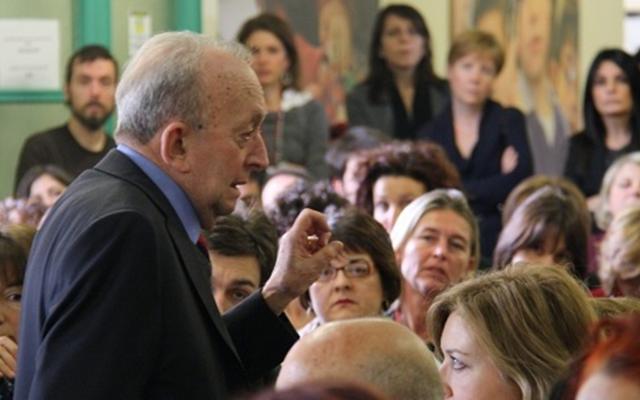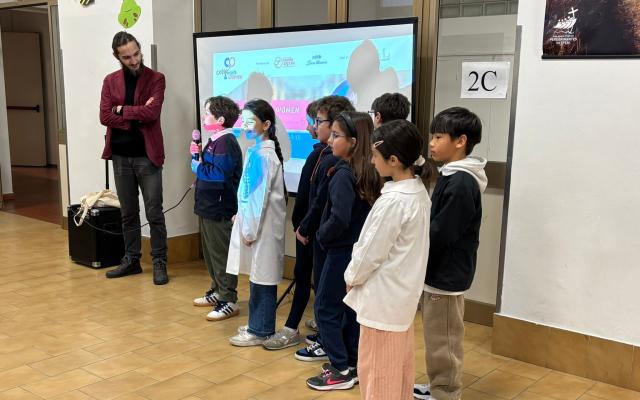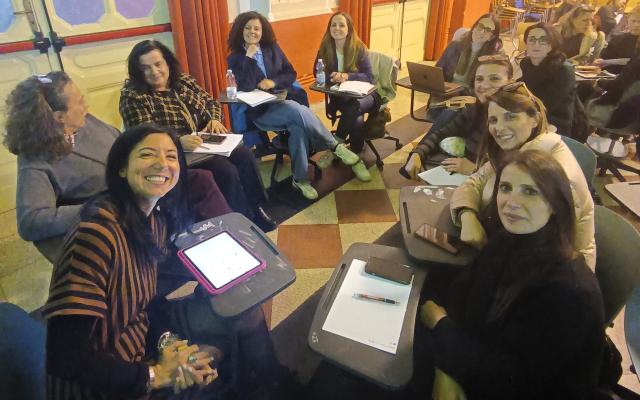Eight students on stage at the Corriere della Sera event in Milan
For the first time, L’Economia del Futuro welcomed not only entrepreneurs, experts and journalists, but also students, the real protagonists of this edition dedicated to “Words to understand” our present. Thanks to the contribution of the Fondazione Mondo Digitale, around a hundred young people from Milanese schools filled the audience of the Salone d'Onore and eight of them took to the stage for a direct discussion with representatives from the worlds of economics, academia and communication [see the news item When the stage becomes a school].
The schools involved
- Severi Correnti with headteacher Gabriella Maria Sonia Conte and teachers Rosanna Silvaggio and Ilario Tonel
- Carducci with headteacher Andrea di Mario and teacher Elena Lori
- Schiaparelli-Gramsci with headteacher Francesca Giuranna and teachers Anna Maria Randazzo and Sabina Daverio.
A courageous dialogue, prepared with great seriousness by the students, as Cecilia Stajano, community manager for Fondazione Mondo Digitale, recalls:
‘It was moving to see the students prepare so well, keen to make a good impression, serious, unafraid to face those who know more than them, convinced and aware of their right to an opinion. If you explain things to young people, they take them very seriously.’
Food, sustainability and information: questions for Paolo Barilla
The stage was inaugurated by Angelica Tordiglione (Liceo Carducci) and Matilda Pampaluna (IIS Severi-Correnti), who were questioned by Daniele Manca about their eating habits and sustainable choices. The two students then asked direct questions to Paolo Barilla, president of Unione Italiana Food: from the role of industry in promoting sustainable nutrition to fake news circulating about food.
Digital twins, innovation and new skills: a discussion with Gianmario Verona and Nicola Saldutti
The second block saw Altea Briola (Liceo Carducci, who turned 18 that very day) and Tommaso Iotti (IIS Schiaparelli-Gramsci) take to the stage. With lucid and mature questions, they questioned Gianmario Verona, professor of Innovation Management at Bocconi University, on the risks and potential of digital twins: from their ability to truly represent human thought to the implications for the future of work and training.
In turn, Verona and Nicola Saldutti, economics editor-in-chief of Corriere, asked the two students what limits they would place on the use of a personal “digital twin”.
Young people, social media and artificial intelligence: a dialogue with Riccardo Luna
In the third block, Noor Ladrici (IIS Severi-Correnti, content creator on TikTok) and Pietro Caporale (Liceo Carducci, rocketry enthusiast) talked to Riccardo Luna about AI, smartphones at school, bans for minors and social media addiction.
Then it was the students' turn to question Luna: Noor on digital addiction, Pietro on the environmental impact of artificial intelligence and the water consumption required to run data centres.
Biodiversity and sustainability in everyday choices: the meeting with Daniela Bernacchi
The event concluded with Riccardo Somaschi and Giorgio Chiesa (Liceo Carducci), who asked Daniela Bernacchi, executive director of UN Global Compact Network Italia, questions about the health of the planet and the meaning of biodiversity.
Bernacchi questioned the students about their consumption choices and the centrality of sustainability in their professional future.
When the stage becomes a school, really
In an atmosphere of mutual listening, the students brought authentic perspectives, unexpected questions and a willingness to get involved to the stage, which surprised many of the guests. The future of the economy, as this day showed, also depends on the ability to create spaces where young people are not spectators but active participants in public debate.
This experience confirms what has already emerged in other initiatives: when we place our trust in young people, they respond with responsibility, depth and courage.



